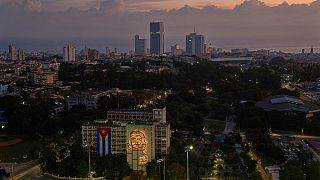Cuba
On their knees, blindfolded, five young people listen to blessings in Yoruba, a language brought by African slaves more than four centuries ago, while swearing to be brave, good parents, children and friends, respectful and upright: they are the new Abakuas, a cult unique Cuban in Latin America.
Economic difficulties and the COVID-19 pandemic pushed many young Cubans to take refuge in religion, including this cult that was born as a brotherhood of protection between Carabali slaves who worked as stevedores in the port of Havana almost 200 years ago.
“With this problem of the pandemic, it has grown a lot, we have had a lot of faith,” Juan Ruiz Oña o Yamba, the second authority of the temple said, identified by the Abakuas as Efi Barondi Cama.
The intimate ceremony, to which only the Abakuas and their guests have access, takes place in the Simpson neighborhood, characterized by the presence of several of its temples and located in the western city of Matanzas.
With a rooster in hand, El Ireme or “little devil” is in charge of cleaning the initiates.
This abakúa dressed in an imposing devil outfit passes the bird through the kneeling bodies to eliminate the bad, before they enter the sacred room where the secret oath ceremony is performed.
The “little devil”, which dances stimulated by the songs and rhythms of sacred drums, represents the presence of the ancestors.
“Contribute with our brothers”
It is estimated that in Cuba there are about 130 powers, games or plants, an indistinct name for these groups made up only of heterosexual men, who over time lost their secret character, but not their rigid rules and principles, among them the protection of the “ecobio” , his brother of faith.
Along with the Cuban Santeria or Regla de Ocha and the Palomonte or Conga Rule, the Abakuá cult is one of the main religions of African origin that maintains strength on the island, but unlike the other two, it is exclusive to Cuba.
***AFP***











02:18
Netherlands returns 119 artifacts looted from Nigeria
02:18
New York research centre celebrates 100 years of documenting Black culture
02:20
In Brazil, knights and masked riders take to a football pitch for religious festival
01:21
Scorching heat challenges pilgrims at mount Arafat during sacred Hajj ritual
01:01
Egypt tells Greece sovereignty of Sinai monastery assured
01:13
Muslims from around the world begin annual pilgrimage to Mecca